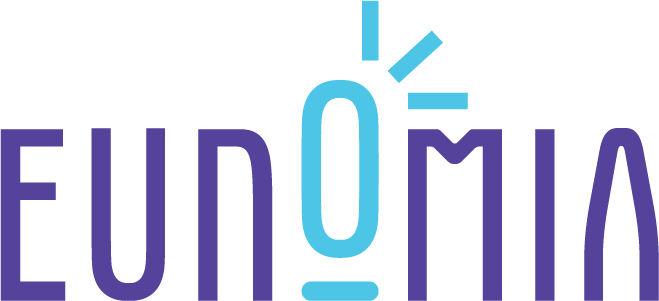 https://www.synyo.com/wp-content/uploads/SYNYO-NEWS-featured-image-Press-Release.png
400
459
leo
https://www.synyo.com/wp-content/uploads/2017/09/synyo-logo.png
leo2025-12-15 09:55:062025-12-18 09:55:28ReIncluGen: European Research Project Maps New Ways to Strengthen Support for Migrant Women
https://www.synyo.com/wp-content/uploads/SYNYO-NEWS-featured-image-Press-Release.png
400
459
leo
https://www.synyo.com/wp-content/uploads/2017/09/synyo-logo.png
leo2025-12-15 09:55:062025-12-18 09:55:28ReIncluGen: European Research Project Maps New Ways to Strengthen Support for Migrant WomenEUNOMIA

EUNOMIA: Project to combat misinformation with decentralized, secure and trustworthy social media
EUNOMIA is an innovation project with the aim to develop the first social media environment that will prioritise trust over likes. It is fully decentralised, supported by a unique peer-to-peer and blockchain infrastructure, and will build on Mastodon and diaspora*, the biggest decentralized social media platforms. Its open-source tools help the user in assessing quickly and confidently how trustworthy information is – without relying on any third-party expert or social media platform to do it for them.
Misinformation is a societal challenge with multiple layers. From breaches of private data to the prevalence of fake content and news, social media has been the point of entry for malevolent actors in our daily lives. When it goes uncorrected, misinformation can endanger democracy, split society and even put individuals’ lives at risk. EUNOMIA: User-oriented, secure, trustful & decentralised social media is a three-year EU-funded Innovation Action project (H2020) with the goal to assist users of social media in:
- identifying the provenance of information;
- assessing its trustworthiness; and
- protecting their community against misinformation.
EUNOMIA tools will be developed in two main phases: the first phase is dedicated to the development of the technical tools that will allow users to track the provenance of information and changes over time, along with other indicators of trustworthiness. These include AI-generated contextual information such as stance (subjectivity and objectivity) and sentiment (positive and negative). In the second phase, the tools will be tested and iteratively improved. A co-design process – which will ensure user’s needs and requirements, as well as insights on their behaviour – is considered throughout the project.
Decentralised and secure social media
Intermediary free and decentralized, EUNOMIA builds on social media platforms like Mastodon and diaspora*. Rather than being owned by one commercial company, these social media platforms allow the user to take back ownership of their own data.
By facilitating immediate assessment of social media content trustworthiness, it supports and encourages the sharing of trustworthy content. Therefore, EUNOMIA is an excellent example of micro co-regulation, as is its use of blockchain technology in establishing the integrity of the data sharing. Unlike the current scenario applied to centralised social media such as Twitter or Facebook, who take on the role of selectively tagging what is credible or not, EUNOMIA powered social media players can remain neutral platforms, allowing their users to take ownership of their content and its trustworthiness.
The EUNOMIA consortium
EUNOMIA unites a highly complementary consortium of ten partners from nine European countries from cross-disciplines and cross-sectors including academic, decentralised social media, public journalism organisations and SMEs. The team will develop decentralised and open-source solution to assist social media users (traditional media journalists, social journalists and citizen users) in determining the trustworthiness of information. Coordinated by the University of Greenwich, the project team includes the University of West Attica, the University of Nicosia, Inov, SIVECO, Trilateral Research and SYNYO. Furthermore, the project involves Eugene Rochko, the founder of Mastodon, Österreichischer Rundfunk, the Austrian public broadcasting company, and Blasting News, the largest social journalism platform. Within this complementary team, SYNYO is responsible to analyse user behaviour online, and to evaluate the two pilot phases of the project.
Links
Press release: https://www.synyo.com/wp-content/uploads/EUNOMIA-Press-release.pdf
Keywords
Misinformation, Disinformation, Fake News, Blockchain, Peer-to-peer, Decentralized Social Media, Trust




